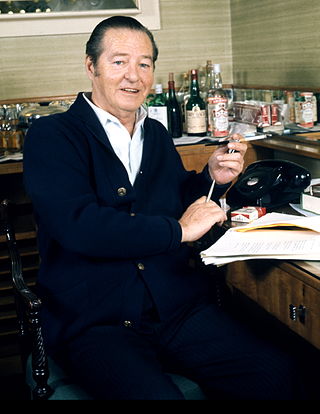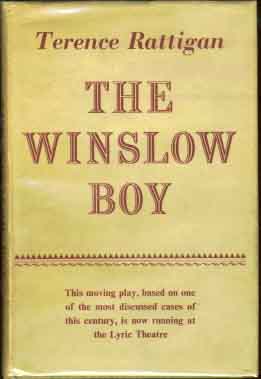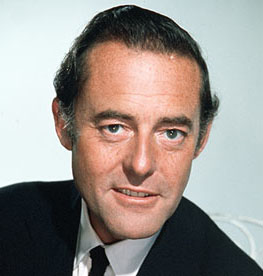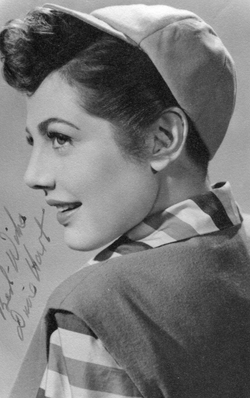
Sir Terence Mervyn Rattigan was a British dramatist and screenwriter. He was one of England's most popular mid-20th-century dramatists. His plays are typically set in an upper-middle-class background. He wrote The Winslow Boy (1946), The Browning Version (1948), The Deep Blue Sea (1952) and Separate Tables (1954), among many others.

The Browning Version is a play by Terence Rattigan, seen by many as his best work, and first performed on 8 September 1948 at the Phoenix Theatre, London. It was originally one of two short plays, jointly titled "Playbill"; the companion piece being Harlequinade, which forms the second half of the evening. The Browning Version is set in a boys' public school and the Classics teacher in the play, Crocker-Harris, is believed to have been based on Rattigan's Classics tutor at Harrow School, J. W. Coke Norris (1874–1961).

The Deep Blue Sea is a British stage play by Terence Rattigan from 1952. Rattigan based his story and characters in part on his secret relationship with Kenny Morgan, and the aftermath of the end of their relationship. The play was first performed in London on 6 March 1952, directed by Frith Banbury, and won praise for actress Peggy Ashcroft, who co-starred with Kenneth More. In the US, the Plymouth Theater staged the play in October 1952, with Margaret Sullavan. The play with Sullavan subsequently transferred to Broadway, with its Broadway premiere on 5 November 1953, and running for 132 performances.

Kenneth Gilbert More, CBE was an English film and stage actor.

The Winslow Boy is an English play from 1946 by Terence Rattigan based on an incident involving George Archer-Shee in the Edwardian era. The incident took place at the Royal Naval College, Osborne.

Jack Stanley Watling was an English actor.

Philotas was the eldest son of Parmenion, one of Alexander the Great's most experienced and talented generals. He rose to command the Companion Cavalry, but was accused of conspiring against Alexander and executed.

Terence Joseph Alexander was an English film and television actor, best known for his role as Charlie Hungerford in the British TV drama Bergerac, which ran for nine series on BBC1 between 1981 and 1991.

French Without Tears is a comic play written by a 25-year-old Terence Rattigan in 1936.

Eric Harold Portman was an English stage and film actor. He is probably best remembered for his roles in three films for Michael Powell and Emeric Pressburger during the 1940s.

Benjamin Arthur Flemyng, known professionally as Robert Flemyng, was a British actor. The son of a doctor, and originally intended for a medical career, Flemyng learned his stagecraft in provincial repertory theatre. In 1935 he appeared in a leading role in the West End, and the following year had his first major success, in Terence Rattigan's comedy French Without Tears. Between then and the Second World War he appeared in London and New York in a succession of comedies.

Rodney Ackland was an English playwright, actor, theatre director and screenwriter.

Ross is a 1960 play by British playwright Terence Rattigan.
Peter Glenville was an English film and stage actor and director.

Diane Lavinia Hart was an English actress in both films and the theatre in the West End Theatre of London, political campaigner, and inventor.

Flare Path is a play by Terence Rattigan, written in 1941 and first staged in 1942. Set in a hotel near an RAF Bomber Command airbase during the Second World War, the story involves a love triangle between a pilot, his actress wife and a famous film star. The play is based in part on Rattigan's own wartime experiences, and was significantly reworked and adapted for film as The Way to the Stars.
Sean O'Connor is an English producer, writer, and director working in theatre, film, television and radio. He was the editor of the long-running BBC radio drama, The Archers from 2013 to 2016. He replaced Dominic Treadwell-Collins as the executive producer of EastEnders in June 2016. 1

In Praise of Love, originally entitled After Lydia, is the first part of a 1973 double-bill play by the English playwright Terence Rattigan. It was the penultimate play he wrote.
Adventure Story is a British television play, based on the stage play by Terence Rattigan, and tells the story of Alexander the Great and his conquest of Persia. It featured Sean Connery in his first starring role and was praised at the time for its acting.

Beryl Measor was a British actress. She created roles in plays by Noël Coward and Terence Rattigan. In addition to her stage career she broadcast frequently on BBC radio and television, and appeared in several cinema films.

















